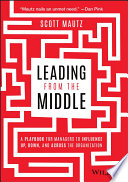

Middle managers play a crucial role in bridging the gap between upper management and frontline employees. Empowering these individuals can lead to enhanced decision-making, increased morale, and better alignment of team goals with organizational objectives. The book emphasizes that middle managers should be equipped with the authority and resources necessary to make impactful decisions. By fostering a culture of trust and support, organizations can leverage the unique position of middle managers to drive performance and innovation.
Continue readingEffective communication is highlighted as one of the most important skills for leaders, especially for those in middle management. The book discusses various communication strategies that can help middle managers convey their ideas clearly and build strong relationships with their teams. It emphasizes the importance of active listening, providing constructive feedback, and creating an open dialogue. By honing their communication skills, middle managers can foster a collaborative environment and ensure that their teams are aligned with the organization's vision.
Continue readingMiddle managers often find themselves in a position where they must navigate the complexities of organizational politics. The book provides insights on how to effectively manage relationships, influence stakeholders, and advocate for their teams. Understanding the dynamics of power and influence within an organization is essential for middle managers to advance their initiatives and drive change. The authors suggest strategies for building alliances and managing conflicts, which can ultimately lead to greater organizational effectiveness.
Continue readingA growth mindset is crucial for leaders who wish to inspire their teams and drive innovation. The book outlines the importance of fostering a culture that embraces learning, experimentation, and resilience. Middle managers are encouraged to model a growth mindset by seeking feedback, learning from failures, and encouraging their teams to take calculated risks. This approach not only enhances individual and team performance but also contributes to a more agile and adaptable organization.
Continue readingMiddle managers are often responsible for translating the strategic vision of upper management into actionable plans. The book emphasizes the importance of developing strategic thinking skills to effectively contribute to the organization's goals. Middle managers should be able to analyze market trends, identify opportunities, and align their team's efforts with the broader organizational strategy. By cultivating a strategic mindset, they can drive meaningful outcomes and position their teams for success.
Continue readingCreating and leading high-performance teams is a key focus of the book. It discusses the attributes of successful teams and the role of middle managers in fostering a positive team culture. The authors provide practical tips on recruitment, team dynamics, and performance management. By investing in team development and creating an environment that encourages collaboration and accountability, middle managers can enhance team performance and achieve organizational objectives.
Continue readingThe book addresses the challenge of balancing day-to-day operational excellence with the need for innovation. Middle managers are often tasked with maintaining efficiency while also driving change. The authors suggest strategies for integrating operational processes with innovative practices, encouraging a culture that values both stability and creativity. By finding this balance, middle managers can ensure that their teams remain competitive and responsive to market changes.
Continue readingThe reading time for Leading from the Middle depends on the reader's pace. However, this concise book summary covers the 7 key ideas from Leading from the Middle, allowing you to quickly understand the main concepts, insights, and practical applications in around 25 min.
Leading from the Middle is definitely worth reading. The book covers essential topics including Empowerment of Middle Managers, Communication as a Key Leadership Skill, Navigating Organizational Politics, providing practical insights and actionable advice. Whether you read the full book or our concise summary, Leading from the Middle delivers valuable knowledge that can help you improve your understanding and apply these concepts in your personal or professional life.
Leading from the Middle was written by Scott Mautz.
If you enjoyed Leading from the Middle by Scott Mautz and want to explore similar topics or deepen your understanding, we highly recommend these related book summaries:
These books cover related themes, complementary concepts, and will help you build upon the knowledge gained from Leading from the Middle. Each of these summaries provides concise insights that can further enhance your understanding and practical application of the ideas presented in Leading from the Middle.